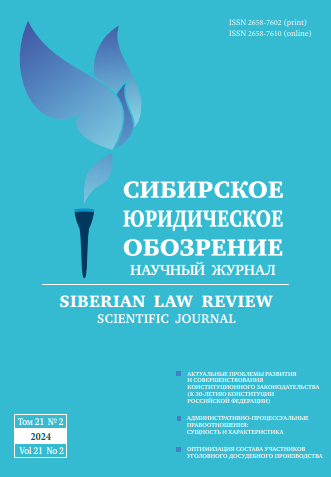Provision of Qualified Legal Assistance to Individuals Subjected To Covert Operational Investigative Measures in Cases Where These Activities Take Public Forms
- 作者: Gusev V.A.1, Gerasimenko E.V.1
-
隶属关系:
- Omsk Academy of the Ministry of the Interior of Russia
- 期: 卷 21, 编号 2 (2024)
- 页面: 220-237
- 栏目: CRIMINAL LEGAL SCIENCES
- ##submission.datePublished##: 21.10.2024
- URL: https://journal-vniispk.ru/2658-7602/article/view/348924
- DOI: https://doi.org/10.19073/2658-7602-2024-21-2-220-237
- EDN: https://elibrary.ru/GWGGVJ
- ID: 348924
如何引用文章
全文:
详细
The subject of this study encompasses the legal relations that emerge between citizens and officials within operational units of governmental bodies. Operational investigative activities typically occur covertly, rendering the involvement of a lawyer in such clandestine processes and the provision of qualified legal assistance to individuals subject to secret operational investigative measures impossible. This contravenes the core nature of operational investigative activities, which inherently rely on secrecy and confidentiality. Simultaneously, during the initial covert operational search activities, operational personnel, upon gathering requisite materials and information, reveal their affiliation with law enforcement agencies and proceed to detain a suspected individual. The objective of this study is to delineate the mechanism for safeguarding the right to competent legal assistance for individuals subjected to coercive actions by operational personnel. At the moment of transformation of covert operational investigative measures into public, the rights and freedoms of the person in respect of whom these measures were carried out may be limited and he needs to use the constitutional right to receive qualified legal assistance from a lawyer. The conclusions of the study. During the concluding phases of verification procurement, operational implementation, controlled delivery, and operational experimentation, if a determination is made to decrypt and publicly document the outcomes of operational searches, operational personnel undertake actions that curtail the rights and freedoms of individuals suspected of criminal involvement. Specifically, the following rights are briefly curtailed: the right to freedom of movement; the right to utilize means of communication; the right to inviolability of the home; the right to utilize and manage one's property (buildings, structures, land areas, and vehicles), encompassing objects, substances, and documents therein. The apprehension of a suspected individual, their personal search, and the inspection of the premises by law enforcement authorities are essential and integrated components of the operational search operation, initially conducted covertly and later transitioning into a public process. In this context, all obtained results should be collectively considered and appraised as the unified outcome of a specific operational search operation, subsequently formalized by an operational officer through a singular protocol detailing the entirety of these operational search activities. Once officials from operational units curtail the right to personal inviolability, freedom of movement, and other constitutional rights and freedoms, the suspected individual must be afforded the opportunity to exercise their right to competent legal assistance, as stipulated in Article 48 of the Constitution of the Russian Federation. Operational staff are required to notify the lawyer of the suspected person and ensure his admission to the place of the operational search activity. A lawyer retains the right to be present at any phase of publicly documenting the outcomes of an operational search operation and, as part of rendering legal assistance, can insist on adherence to the rule of law and provide comments in the protocol.
作者简介
Vladimir Gusev
Omsk Academy of the Ministry of the Interior of Russia
编辑信件的主要联系方式.
Email: gusevva@mail.ru
ORCID iD: 0000-0003-3185-532X
SPIN 代码: 9825-8349
Deputy Head, Doctor of Legal Sciences, Professor
俄罗斯联邦, 7 Komarova pr., Omsk, 644092Evgeniy Gerasimenko
Omsk Academy of the Ministry of the Interior of Russia
Email: geras_ev@mail.ru
ORCID iD: 0009-0008-7562-4076
SPIN 代码: 5741-6321
Senior Lecturer of the Department of Operational Investigative Activities of the Internal Affairs Bodies, Candidate of Legal Sciences
俄罗斯联邦, 7 Komarova pr., Omsk, 644092参考
- Chechetin A. Ye. The Actual Problems of a Person’s Rights Support in the Operative Investigative Activity of the Criminal Investigation Department. Proceedings of the Management Academy of the Ministry of Interior of Russia. 2019;1:125-134. (In Russ.)
- Sementsov V. A. On Inadmissible Application in Proving of Data Obtained in the Course of a Covert Interview of a Suspect, Accused. Criminal Law. 2018;4:118-121. (In Russ.)
- Lugovik V. F. Legal Surrogates and Coercion in Crime Detection. Scientific Bulletin of the Omsk Academy of the MIA of Russia. 2017;2:24-31. (In Russ.)
- Glushkov M. R. On the Issue of Participation of an Advokat in Public-Disclosed Operational-Search Measures. Advocate’s Practice. 2015;3:3-6. (In Russ.)
- Suprun S. V. Detention During the Orm “Test Purchase”. Criminal Procedure. 2014;3:46-54. (In Russ.)
- Sementsov V. Detention of Suspekt at Stage of Institution of a Crimigal Case. Criminal Law. 2010;1:100-103. (In Russ.)
- Rossinskiy S. B. Discussion About the Essence and Legal Nature of the Suspect’s Detention Continues. Actual Problems of Russian Law. 2018;6:134-145. https://doi.org/10.17803/1994-1471.2018.91.6.134-145 (In Russ.)
- Ksendzov Y. Y. The Problems of Detention Before the Criminal Case Is Initiated. Law and Politics. 2008;7:1774-1778. (In Russ.)
- Lugovik V. F. Crime Detection Code of the Russian Federation (the Author’s Draft of the Federal Law). Legal Science and Law Enforcement Practice. 2015;1:109-135. (In Russ.)
- Maximov A. A. Conditions for Ensuring the Legality of the Operational Experiment. Russian Justice. 2019;5:57-59. (In Russ.)
- Lazareva V. A. Problems of Ensuring the Rights of Individuals Subject to Operational Search Measures as Conditions for the Admissibility of Using Obtained Results as Evidence in Criminal Cases. In: Kalinovskii K. B. (Comp.). Constitutional and Legal Issues of Operational Search Activities. St. Petersburg: Petropolis Publ.; 2012. P. 155-165. (In Russ.)
- Polyakov M. P. Criminal Procedural Interpretation of Operational Search Activities Results. Nizhny Novgorod: Nizhny Novgorod Law Academy Publ.; 2001. 260 p. (In Russ.)
- Churkin A. V. Participation of an Attorney in Operational-Investigative Activity. Field Investigator (Sleuth). 2009;2:24-29. (In Russ.)
- Mazyuk R. V. On a Person Suspected Within the Framework of Criminal Intelligence and Surveillance Activities and His Right to an Attorney. Advocate’s Practice. 2023;2:30-34. https://doi.org/10.18572/1999-4826-2023-2-30-34 (In Russ.)
补充文件












